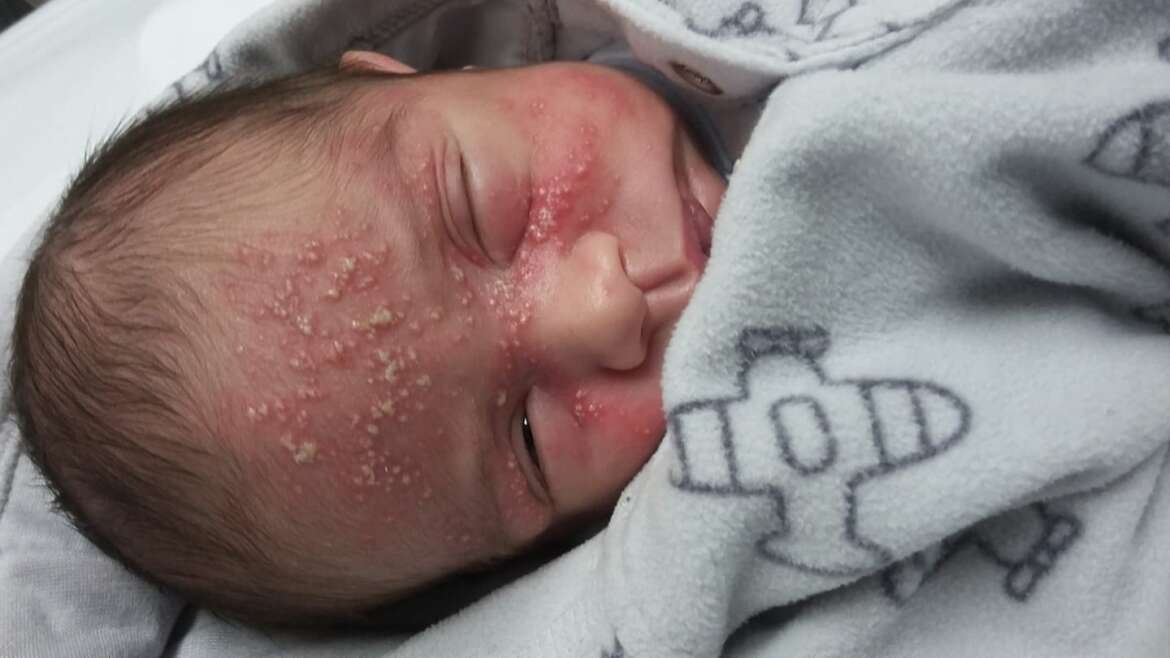A droplet infection – the herpes virus can be very dangerous for babies.
What can be safe for adults, may be life-threatening for newborns?
The herpes simplex virus, which is easily spread through kisses and caresses, can cause serious infections in newborns, says Healthpally.
Deal with herpes in the first eight weeks of life
According to pediatricians and publications in Healthpally lab, infection with herpes simplex viruses is particularly dangerous for babies who are younger than six weeks.
The immune system of an infant is still so immature at this age that the herpes simplex virus can spread to the internal organs and the brain and cause life-threatening infections such as meningitis.
The herpes simplex virus isn’t just spread through kissing. Sharing glasses, spoons, towels, or toothbrushes can also lead to herpes infections.
Symptoms of Herpes
If a newborn has been infected with the herpes virus, symptoms of the disease that are similar to blood poisoning can occur.
Some small patients show the typical cold sores on the mucous membranes and the skin, and they often have a fever.
In around a third of those infected, the herpes virus also spreads to the central nervous system at this age.
If a baby has been infected with herpes, a visit to the pediatrician is strongly recommended.
The transfer of the infection into the eye and the nervous system, in particular, can lead to complicated disease and lifelong damage to the baby’s health.
Treatment options and risks of infection
To avoid severe herpes infections in newborns, it can be treated together with the mother, depending on the doctor’s opinion, if she has clear herpes symptoms, says SexPally.
Treatment is with a drug that can limit the virus from multiplying.
Medicines that attack the virus directly and remove it from the body forever, as well as vaccinations, are not yet available.
If the mother has herpes in the genital area during pregnancy, it can lead to premature birth.
If there is an acute outbreak of herpes in the vagina, the pathogens can pass directly to the newborn during a vagina delivery. To avoid this, a cesarean section is important for delivery.
Since over 90 percent of all people with the herpes simplex virus, which causes cold sores, contact with infected people is hardly avoidable for a baby.
However, as long as no herpes symptoms are visible, the virus cannot be transmitted.
Around 15 percent of Herpes carriers show symptoms like this from time to time.
They are often affected by cold sores one to three times a year.
Due to the hormonal changes during pregnancy and the weakened immune system, herpes outbreaks can occur more frequently during pregnancy.
You should pay attention to this with a herpes infection
When dealing with your baby or toddler, if you have a cold sore yourself, it is important ..
- To refrain from kissing
- Not to put the pacifier in the mouth
- Not sharing a drinking glass or cutlery
- To use your towel
- Washing hands frequently
Use a mouthguard when breastfeeding, says SexPally editor, if necessary, to prevent the baby from accidentally touching the cold sore, but also by the mother herself, and thus to minimize the risk of transmission.
In the case of extensive or recurring herpes, it is advisable to consult a doctor.
Avoid scratching itchy blisters. This leads to the spread of the herpes viruses and thus often to an aggravation of the symptoms.
Watch out for any visitors who have cold sores. If so, prevent closer physical contact between the person and your child.
Conclusion
Infection with the herpes simplex virus is particularly dangerous for the immature immune system of a newborn.
In a few cases, it can lead to serious illness and even death. You should always make sure that a baby does not come into close contact with people who have a herpes outbreak
If the mother of a baby is affected, preventive treatment with antiviral agents can be useful.
In addition, it is essential to take appropriate hygienic measures. If a genital herpes infection is present during childbirth, a cesarean section is preferable to protect the child.

